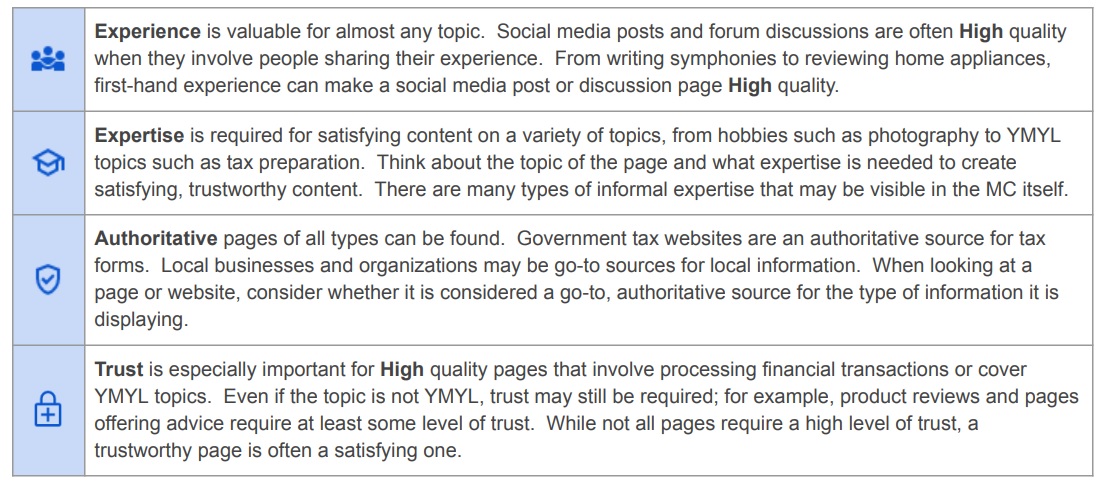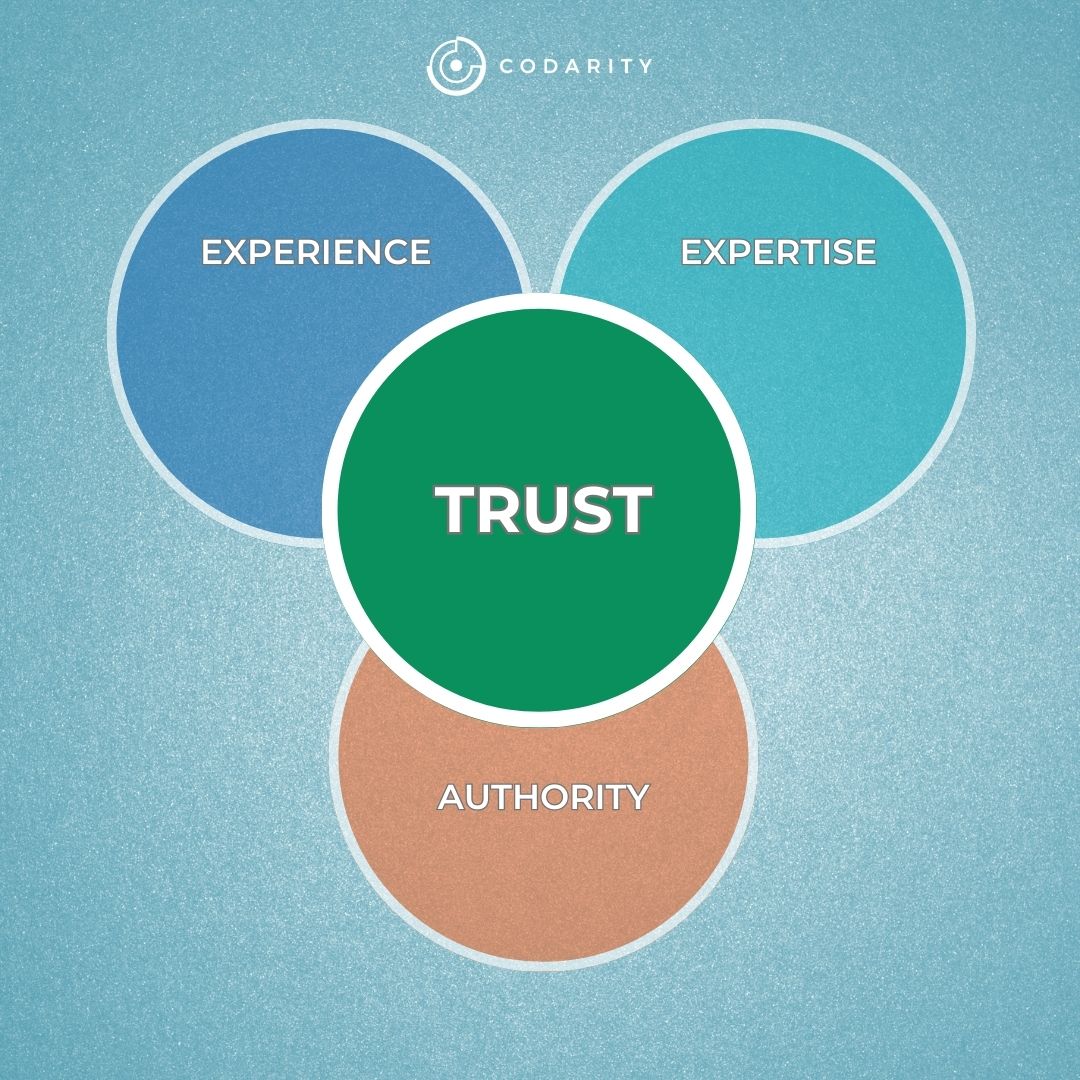Dan Charles
02/06/2023
Table of Contents
As a business owner looking to improve your online presence and search engine rankings, understanding Google’s Quality Rater Guidelines is essential. In this comprehensive guide, we’ll explore the significance of these search quality rater guidelines for Google search itself, how they impact your business, and how partnering with a reputable SEO agency like Codarity can make all the difference.
Google Quality Rater Guidelines Explained
Google Quality Rater Guidelines are a set of instructions provided by Google to a team of human evaluators, known as search quality raters, who assess the quality of web pages and search results. Their primary goal is to help Google fine-tune its search algorithm, ensuring users receive the most relevant and high-quality content in its search results.
One of the core principles within the guidelines is E-E-A-T, which stands for Experience, Expertise, Authoritativeness, and Trustworthiness. Google places a strong emphasis on these three factors top ranking sites when determining the quality of content created on website pages.
For more information on Google Quality Rater Guidelines, as well as a link to the 176-page guide, visit Google’s Search Quality Raters support page.
Quality Raters and Search Results
Quality raters play a vital role in user’s intent when assessing what pages show up search results. They are given real search queries and asked to rate the quality of the pages that appear in Google’s own search bar and results. Their feedback helps Google understand how well its search algorithm is performing and identify areas for improvement.
Raters are trained to differentiate between high-quality and low-quality content, ensuring that users receive the best possible search results. High-quality content in search results that is informative, well-structured, and trustworthy, while low-quality content can be spammy, misleading, or lack substantial information.
What Does a Google Quality Rater Do?

A Google Quality Rater plays a crucial role in the ongoing improvement of Google’s search algorithm. They provide valuable feedback that helps Google identify areas where search results can be enhanced. Raters are responsible for evaluating websites and search results based on specific guidelines, focusing on ensuring users receive the most relevant and high-quality content possible.
Some key tasks performed by Google Quality Raters include:
- Language and content classification: Raters identify the language of a web page and classify the content based on its relevance, quality, and overall importance.
- Evaluating search results: Raters assess the quality of search results for various queries, providing insights into how well Google’s search algorithm is performing.
- Improving search systems: By offering feedback on search results, raters contribute to the continuous improvement of Google’s search systems and help fine-tune the algorithm.
In summary, Google Quality Raters play an essential role in ensuring that Google’s search algorithm delivers accurate, relevant, and high-quality search results to users worldwide.
Page Quality Rating Guidelines
Page quality rating guidelines help search quality raters to assess the overall quality of a web page. Some key factors considered in page quality and rating scales include:
- User intent: Raters examine whether a page meets the needs of users based on their search intent.
- Search intent: The content must align with the purpose of the search query.
- Design and user experience: A well-designed, easy-to-navigate website can contribute to a higher page quality rating.
In addition to these other factors above, raters are trained to identify and avoid low-quality web pages and harmful pages that could negatively impact a user’s online experience.
Importance of E-E-A-T for Businesses

Implementing E-E-A-T in your content creation process can significantly impact your page quality and search rankings. By demonstrating experience, expertise, authoritativeness, and trustworthiness in your content, you’re more likely to gain the Google search algorithm’s favour and improve your visibility in search results.
For example, a financial advisor can showcase their expertise by writing in-depth articles about investment strategies, demonstrating authoritativeness by providing relevant industry certifications and building trustworthiness through positive client testimonials.
Improving Content Quality with Google’s Guidelines
To create high-quality content that aligns real users with Google’s guidelines, keep these tips in mind:
- Understand user location and intent: Tailor your content to the needs and preferences of your target audience, considering factors such as location and search intent.
- Stay updated with search algorithms: Regularly monitor changes in Google’s search algorithms and adjust your content strategy accordingly.
- Utilise external signals: Leverage brand mentions, reliable sources, and other external signals to enhance the credibility of your content.
By following these general guidelines, you can create content that ranks higher in search results and better serves your audience’s needs.
Money or Your Life (YMYL) Topics
YMYL topics refer to content that can significantly impact a person’s well-being, financial stability, or safety. Google places a higher emphasis on E-E-A-T for YMYL content, as inaccurate or misleading information can have severe consequences.
To ensure the highest quality pages and trustworthiness for YMYL content, consider navigating the challenges of creating content for YMYL niches by thoroughly researching your topics, using reputable sources, and providing accurate information. Doing so can help your YMYL content rank higher in search results and improve your online reputation.
Working with an SEO Agency like Codarity
Partnering with a reputable SEO agency like Codarity can significantly benefit your business. By leveraging their expertise in Google Quality Rater Guidelines, content creation, and SEO strategies, you can improve your search rankings and online visibility. Some advantages of working with Codarity include:
- Tailored SEO strategies that align with Google’s guidelines
- Expert advice on creating high-quality, E-E-A-T focused content
- Comprehensive support to improve search rankings and drive more organic traffic
For example, Codarity can help you use SEO for brand awareness by optimising your on-page SEO, creating valuable content that attracts your target audience, and implementing strategic link-building campaigns.
To Wrap It Up
Understanding Google Quality Rater Guidelines is crucial for business owners looking to succeed in the digital world. By following these search quality rater guidelines, and prioritising E-E-A-T in your content creation process, you can improve your search rankings and online reputation.
Partnering with a reputable SEO agency like Codarity can help you navigate the complexities of Google’s guidelines and implement effective SEO strategies tailored to your business. With expert support and a commitment to quality, you can achieve lasting success in the competitive online landscape.

Behind the Podcast: What Event Businesses Really Need to Break the Feast-or-Famine Cycle

The Real AI Revolution in Events Isn’t What Cvent’s Selling

Why Your Event Business Doesn’t Need More Martech: It Needs a Coherent Message



